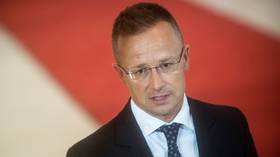EU member sets conditions for Ukrainian accession talks
Hungary’s top diplomat Peter Szijjarto said Kiev should first repeal all laws discriminating against its Hungarian minority
Budapest will block EU accession talks for Ukraine as long as Kiev continues to discriminate against the Hungarian ethnic minority in the west of the country, its Foreign Minister Peter Szijjarto has warned.
The diplomat demanded that the neighboring country repeal a number of laws seen by Budapest as curtailing the rights of the Hungarian community.
In an interview with RIA Novosti published on Saturday, Szijjarto described the situation in Ukraine as “unacceptable” and “against European norms,” lamenting that Kiev’s actions have seen the number of lessons taught in their mother tongue in Hungarian schools drop to as low as 20% of late.
“For this reason, when a decision is being made on the start of negotiations over Ukraine’s accession, Hungary will not be able to give its consent until the Hungarians [in Ukraine] are given their rights back,” the minister explained.
According to the diplomat, the plight of the ethnic minority has been steadily deteriorating since 2015, with Kiev and Budapest locked in a “permanent conflict” ever since. Szijjarto pointed out that Hungary is merely asking Ukraine to restore the rights that the Hungarian community in the country had eight years ago.
The minister added that at the request of Hungary and Romania, the Council of Europe had earlier asked the Venice Commission for Democracy through Law to examine the treatment of ethnic minorities in Ukraine.
Late last month, Hungarian Prime Minister Viktor Orban also warned that his country would not support the neighboring state “on any issue in international life until it restores the laws that guaranteed the rights of Transcarpathian Hungarians.”
Budapest can veto Kiev’s accession process both within the EU and NATO, as the unanimous consent of all member states is required in both blocs to admit new countries.
Around 156,000 ethnic Hungarians live in Ukraine, most of them in the region of Transcarpathia. Once a part of the Austro-Hungarian Empire, the territory fell under Soviet control after World War II and remained a part of modern Ukraine after the dissolution of the USSR. Ukraine is also home to around 150,000 ethnic Romanians and more than 250,000 Moldovans.
Since 2017, successive laws mandating the use of the Ukrainian language have been enacted, resulting in the closure of around 100 Hungarian schools in Ukraine. This legislation has come under fire from the Council of Europe and human rights groups alike.






Comments are closed.